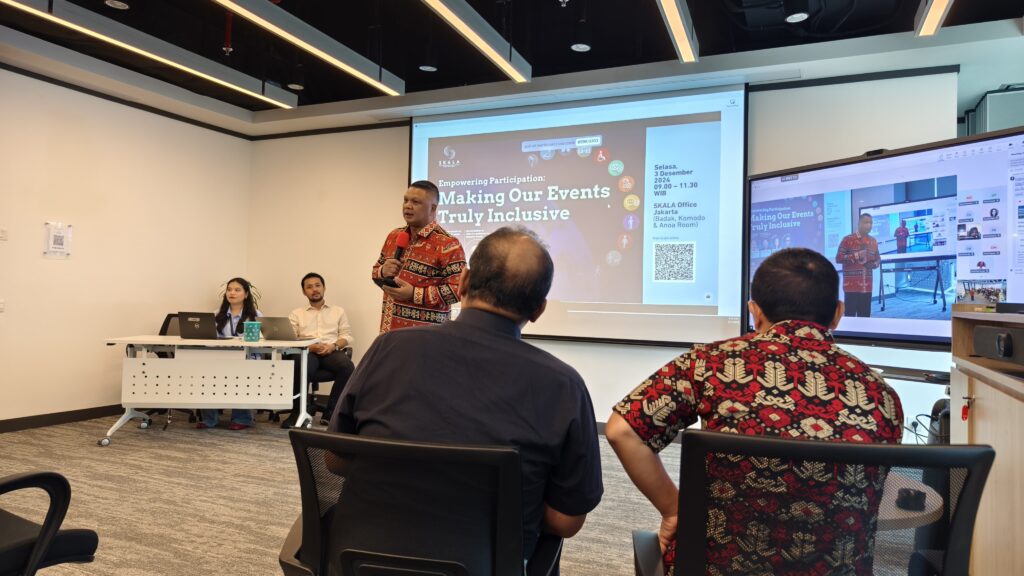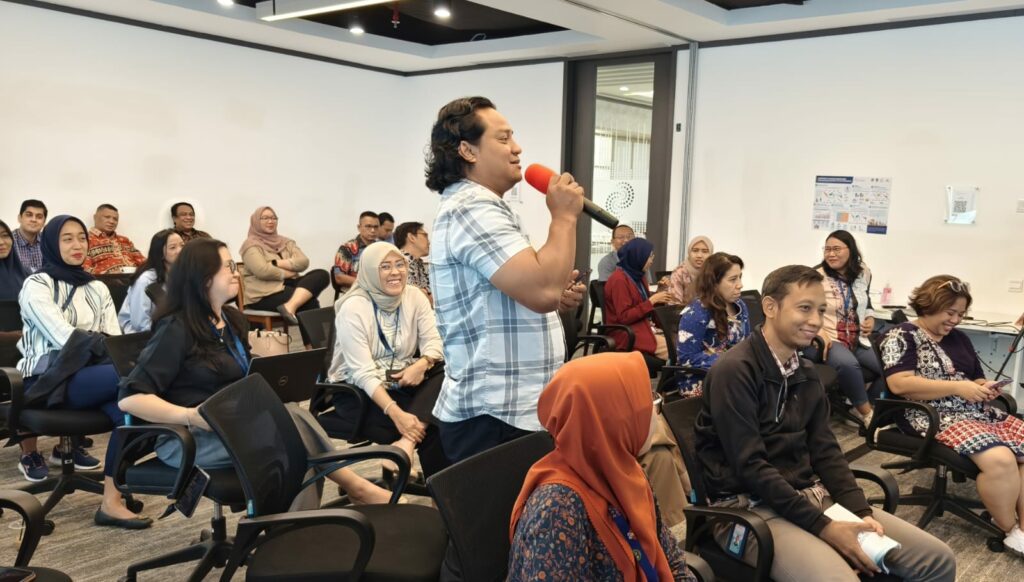Inclusion in Action: Creating Barrier-Free Spaces for People with Disabilities

“In West Nusa Tenggara, SKALA has adopted an inclusive policy for its office environment. In the office kitchen, the placement of sugar, coffee, creamer and tea must remain in the same order. If the positions are changed, I might accidentally mix my coffee with tea,” joked Jaka Yusuf, SKALA GEDSI Coordinator in West Nusa Tenggara, who is blind. A disability activist who moonlights as a comedian under the name Blindman Jack, Jaka uses comedy—both humorously and satirically—to raise public awareness about disability inclusion.
Jaka’s witty remarks carry a deeper message about the importance of creating inclusive spaces for people with disabilities, starting with small, consistent actions. To strengthen these efforts, SKALA hosted an internal awareness session titled “Awareness Session: Making Our Events Truly Inclusive” on 3 December 2024, in celebration of the International Day of Persons with Disabilities. The session was part of the 16 Days of Activism Against Gender-Based Violence campaign, observed annually from 25 November to 10 December. During the session, the SKALA team shared insights and guidance to ensure that SKALA environments and events become more accessible and inclusive.
Barriers: From Stigma to Infrastructure
People with disabilities make up a significant proportion of Indonesia’s population – 22.97 million (BPS-Statistics, 2023), or about one person with a disability for every ten people without disabilities. Yet they continue to face marginalisation and systemic barriers to basic services and opportunities. For example, the 2021 National Socio-Economic Survey (Susenas) found that households with disabilities have less access to sanitation services than those without disabilities. In addition, people with disabilities have lower labour force participation than people without disabilities.
SKALA Disability Advisor Nurul, Saadah Andriani, points out several key barriers that stem from social stigma, individual prejudice, policy gaps and inaccessible infrastructure.
“Stigma, prejudice and rejection remain major barriers that contribute to the marginalisation of persons with disabilities. There is still a widespread belief that they are incapable or abnormal,” said Nurul, who uses a cane every day and sometimes a wheelchair for longer distances.
Infrastructure is another significant barrier. Despite the Minister of Public Works’ Decree No. 30/2006, which sets out guidelines to ensure that buildings are accessible to all – including people with disabilities, the elderly and pregnant women – many public and private buildings still fail to meet these standards.
Inclusion as a New Standard
Inclusive policies and their consistent implementation can break down barriers for people with disabilities. At SKALA, these policies are implemented throughout the organisation, from recruitment to workplace design. At SKALA, 3% of staff are people with disabilities, exceeding the 1% mandated requirement in Law 18 of 2016 on People with Disabilities. During the recruitment process, reasonable adjustments are made to meet the specific needs of candidates, including the provision of assistive devices such as screen readers for candidates with visual impairments. Offices and toilets are fully accessible to people who use wheelchairs.
With a national office, seven provincial offices across Indonesia and numerous workshops, meetings, and events each year, SKALA is committed to ensuring that all of its events are designed and delivered with inclusivity in mind. SKALA Event Support Manager, Fahrein Utama, shared his insights on organising inclusive events based on his experience with the 2011 ASEAN Para Games in Solo, Central Java.
“Helping does not mean pitying. When interacting with people with disabilities, we need to ask them directly about their needs, instead of making assumptions about the help they need,” he explained.
What Fahrein described reflects a key principle in interacting with people with disabilities: respecting them as individuals who have preferences and autonomy. Guided by this principle, SKALA has developed a practical guide to organising an inclusive event, which includes the following three key tools:
- A pre-event checklist to assess the accessibility of the venue and determine the need for disability support
- An attendance list to identify the range of disabilities among participants and assess their specific needs
- A feedback survey to measure the inclusiveness of the event and identify areas for improvement for future planning.
These steps should be taken to ensure that inclusivity becomes the new standard in the way events are carried out. As SKALA Team Leader, Petrarca Karetji, aptly put it, “The disability community reminds us of the diversity of abilities in every individual. It is our shared responsibility to ensure that everyone, regardless of ability, can participate fully and collaborate optimally”.








